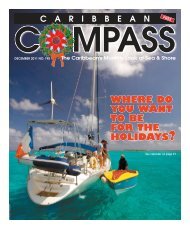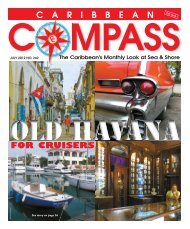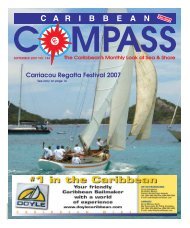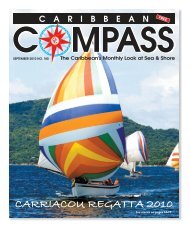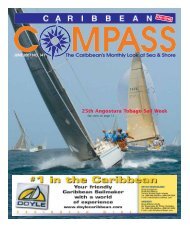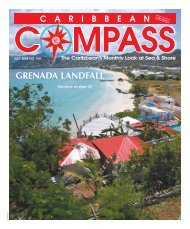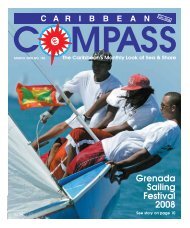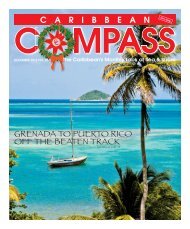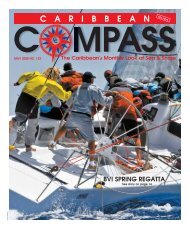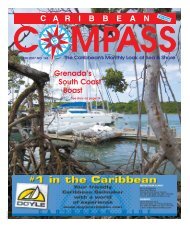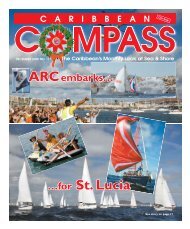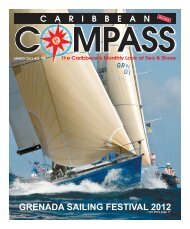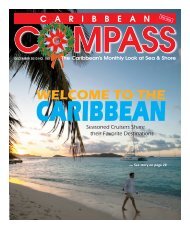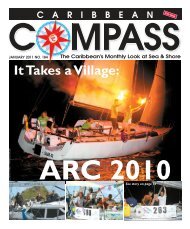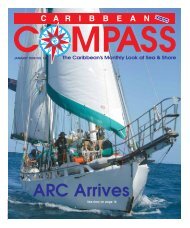Create successful ePaper yourself
Turn your PDF publications into a flip-book with our unique Google optimized e-Paper software.
JULY 2010 CARIBBEAN COMPASS PAGE 38<br />
— Continued from previous page<br />
For up-to-date, comprehensive, non-biased facts and<br />
statistics relating to crime throughout the anchorages of<br />
the <strong>Caribbean</strong>, including Portsmouth, Dominica, I advise<br />
readers to refer to the <strong>Caribbean</strong> Safety & Security Net,<br />
www.safetyandsecuritynet.com/reports.html.<br />
Name Withheld by Request<br />
Dear <strong>Compass</strong>,<br />
In his “Tides Table” food column in May’s <strong>Compass</strong>,<br />
Ross Mavis wrote an interesting piece on dark chocolate,<br />
in which he elaborated some of the health benefits<br />
of this product. He also recommended Xocai<br />
Healthy Chocolate, no doubt a worthy chocolate producer<br />
from Nevada.<br />
I feel that in recommending an American chocolate,<br />
Ross must not know that some of the finest chocolate<br />
in the world is produced right here in the <strong>Caribbean</strong> at<br />
the Grenada Chocolate Company. Their main ingredient<br />
is organic cocoa beans grown at Belmont Estate<br />
just a mile down the road from their factory.<br />
In 2005 the Grenada Chocolate Company won the<br />
bronze medal from the Academy of Chocolate, and in<br />
2008 they won the Silver Medal for organic chocolate,<br />
which they shared with another company (no gold<br />
medal was awarded for organic chocolate that year).<br />
These are extraordinary achievements for a tiny<br />
Grenadian company.<br />
Consumers have the benefit of knowing that Grenada<br />
chocolate is produced from organically grown cocoa<br />
and the people involved from the raw cocoa to the finished<br />
product are shareholders in the company, which<br />
is way cooler even than Fair Trade. Mott, the man<br />
behind the product, also tries to be environmentally<br />
friendly. He generates a good percentage of the electricity<br />
for the plant from a big array of solar panels.<br />
Moreover, the Grenada cocoa is of a particularly fine<br />
flavor because it is mainly of the Trinitarios variety.<br />
(You can read all about the beans at http://www.grenadachocolate.com/beans.html.)<br />
It is the cocoa that is good for you, so a chocolate<br />
high in cocoa content is better than one with more<br />
sugar. I may not have tried hard enough, but I could<br />
not actually find on the Xocai site what the percentage<br />
of cocoa the chocolate was. Grenada Chocolate has for<br />
a long time produced a 71-percent bar, which is in the<br />
high cocoa content category, as well as a 63-percent<br />
bar for those who prefer something sweeter. I am looking<br />
forward to trying their 82-percent cocoa bar, and<br />
the new 60-percent bar that comes with bits of roasted<br />
cocoa bean.<br />
Much of the processing at Grenada Chocolate<br />
Factory is done with antique or custom-made machinery,<br />
and it is very much a “hands-on” product — even<br />
to the point that Mott now delivers his bars of chocolate<br />
to Carriacou by sailing them up from Sauteurs on<br />
a 14-foot beach cat that would not normally go out of<br />
protected waters.<br />
So if chocolate is your thing, and you have not yet<br />
tasted <strong>Caribbean</strong> Grenada Chocolate, now would be a<br />
good time to start.<br />
With regard to news of increased yacht fees in Grenada<br />
(as announced in the June issue of <strong>Compass</strong>), as a<br />
cruiser I am quite okay with Grenada entry fees now<br />
being charged by the month, rather than only on arrival.<br />
As I sail through the islands and explore ashore, I<br />
get to use island infrastructure, including roads; I<br />
meet with a reasonable social order contributed to by<br />
a police force, an educational system and more. I get<br />
to pretty much anchor where I want among myriad<br />
delightful anchorages, none of which belong to me; I<br />
get to snorkel on reefs that also belong to the islands.<br />
I think EC$75 a month (less than US$30) is a bargain<br />
for this, especially when there are two people on board,<br />
at which point it comes to a little less than 50 US cents<br />
a day each.<br />
Each island charges differently. Some charge by the<br />
boat’s length, some by the ton and some by how many<br />
people there are on board. The latter is probably the<br />
most appropriate in terms of the load on the island’s<br />
infrastructure. The Eastern <strong>Caribbean</strong> countries have<br />
now harmonized many rules and regulations so they<br />
are the same throughout the region; I could see benefits<br />
to both the yachting community and governments<br />
if these governments were to get together and come up<br />
with yachting charges that were the same wherever<br />
you are, though it is of course entirely up to each<br />
nation to decide what it wants to do.<br />
If boats do leave Grenada because of the increase in<br />
fees, the effect on the economy will be negative, as the<br />
monthly charges are minimal compared with what a<br />
yachtsperson will spend while on the island. However,<br />
my personal feeling is that these rates are not excessive,<br />
and I would be very surprised if they caused an<br />
exodus of cruisers.<br />
There are a couple of things the Grenada Government<br />
could do that would encourage yachtspeople to visit<br />
and stay in their waters. Normally people on yachts<br />
are checked in for three months, after which they have<br />
to go to the Immigration office at the Botanical<br />
Gardens to get an extension, which is nearly always<br />
granted. If the monthly extensions, up to five or six<br />
months (the time most people hang out for the hurricane<br />
season), could be dispensed by the Immigration<br />
officers at any port of entry, it would make it much<br />
easier for cruisers, as sometimes the Botanical Gardens<br />
visits involve a lot of waiting.<br />
Also, if Grenada were to adopt the two-week in-andout<br />
clearance, like Dominica, or even the three-day<br />
one like St. Lucia, it would encourage many more<br />
yachts sailing in the St. Vincent Grenadines to come<br />
and visit Grenada. I think these moves would be<br />
warmly welcomed by the cruising community.<br />
Chris Doyle<br />
Ti Kanot<br />
Dear <strong>Compass</strong>,<br />
Could this be the same Trinidad described by Ruth<br />
Lund in her article “Trini Home from Home” in the<br />
June <strong>Compass</strong>?<br />
Approaching the Boca de Monos against the ebbing<br />
tide, in order to avoid the punitive Customs overtime<br />
charges awaiting the unprepared, the first thing that<br />
struck us was the oily, foul-smelling slick oozing out of<br />
the Gulf of Paria. Mixed with the flotsam of plastic<br />
bottles and polystyrene food containers were the dead<br />
fish and other detritus of undisciplined civilization. “I<br />
never see anything in my life like this,” was the comment<br />
from my wife, who is Brazilian, and believe me,<br />
coming from a Brazilian that is saying something.<br />
Dodging the more obvious islands of rubbish we<br />
motored slowly past the tranquil Scotland Bay into the<br />
busy commercial port of Chaguaramas. My first<br />
thought was how few yachts there were in the anchorage<br />
compared to my last lengthy visit in 2000, during<br />
my first circumnavigation; even the forest of masts on<br />
shore was much less than I remembered. (The Bay, a<br />
local publication put out by the Yacht Services<br />
Association of Trinidad & Tobago, reported that yacht<br />
numbers were down 36 percent in January and 22<br />
percent in February. They, however, incorrectly in my<br />
opinion, put this fall down to recent piracy incidents<br />
off their coast.) My second thought was how many<br />
commercial vessels now cluttered the harbour. Drilling<br />
rigs, tenders and tugs filled the bay and lined the<br />
shore while fast pirogues weaved through the anchored<br />
yachts with no thought of safety or wake courtesy.<br />
I was pleased to find another yacht at the Customs<br />
dock as rafting up was far preferable to going against<br />
the piles of the “yacht unfriendly” wharf and being<br />
battered by the wake of the passing fishing boats. As<br />
I looked about at the half-empty marinas the word<br />
that came to mind was “tired” — the place looked<br />
“tired”. Paint was fading, signs were old and unreadable<br />
and large fishing boats now occupied the former<br />
berths of mega-yachts.<br />
It is Sunday and the piercing hiss of the sandblasting<br />
from the dry dock blocks out the 24-hour drone of<br />
ships’ generators, reversing trucks and the continual<br />
noise of loading and unloading ships. The oil industry<br />
does not rest. The howler monkeys don’t stand a<br />
chance. Give me cruise ships any day.<br />
The cross wake generated by myriad speeding pleasure<br />
and work boats has turned the anchorage into a<br />
roiling mass and we are now heading to shore to let<br />
our heads and stomachs find some equilibrium. For<br />
years the people affected have tried to get the local<br />
authorities to implement a No Wake Zone, but to no<br />
avail. At one stage someone even put up some signs,<br />
but the signs were reportedly stolen.<br />
In the month we have been here one yacht has been<br />
boarded and robbed in the anchorage, losing its dinghy<br />
and motor (which was lifted at the time), and a<br />
generator he had on deck. Another yacht was boarded<br />
at night in one of the “secure” boat yards. Luckily the<br />
owner was aboard. How many people will return to<br />
find their boats ransacked?<br />
The smell of diesel from the regular fuel spills pervades<br />
the air and there have been at least four incidents<br />
of yachts breaking or dragging the too-closely-spaced<br />
commercial moorings, which we are told are serviced<br />
every three months. In one incident my boat was damaged<br />
but I doubt compensation will be forthcoming.<br />
As I write, a report has just come over the radio<br />
advising that a dinghy with children on board was hit<br />
by a pirogue. It is only time before someone is killed.<br />
Reports to the Coast Guard do not even receive a<br />
reply on the VHF and many people now will not even<br />
bother reporting incidents, as they know nothing will<br />
be done.<br />
Maybe Ruth is protected by her age, but my wife and<br />
other women I have spoken to are constantly the victims<br />
of verbal harassment (the <strong>Caribbean</strong> version of a<br />
“wolf whistle”) and are loath to go anywhere alone,<br />
even in the boatyard where we are paying guests. Few<br />
yachties will venture into town unless it is to one of the<br />
modern shopping malls or as part of an organized<br />
group with their own transport. I have been warned by<br />
the locals that past, safe, entertainment haunts are<br />
now “no go” areas.<br />
Unfortunately I am forced through circumstances to<br />
be here. I need competent medical facilities, not available<br />
on nearby islands, and daily access to the internet,<br />
otherwise I would be somewhere else, and, on a<br />
positive note, it is still probably the best place to procure<br />
yacht parts. AND most of the people really are, as<br />
Ruth describes, friendly and helpful.<br />
The hurricane season is upon us and there is still<br />
plenty of space in the boatyards and marinas. It is<br />
easy to get things done as most contractors are looking<br />
for work and the staff outnumber the customers in the<br />
chandleries. The economic downturn and competition<br />
from other areas is being felt here in a big way. Not<br />
quite the bustling, culturally diverse, paradise destination<br />
that Ruth portrayed in last month’s <strong>Compass</strong>.<br />
Note: The Facebook group site “Trinidad for Cruising<br />
Sailors” established by the Chaguaramas Business<br />
Community may be of interest to those wishing to<br />
find out more about the area. Discussions include the<br />
latest on piracy, progress in the “no wake” campaign<br />
and FAQs.<br />
Ron Llewellyn<br />
Boat Name Withheld by Request<br />
Editor’s note: In light of the issues raised by Ron, we<br />
passed his letter on to the Yacht Services Association of<br />
Trinidad & Tobago for their response, which follows.<br />
Dear <strong>Compass</strong>,<br />
Thank you for forwarding this letter to us for a response.<br />
Although I would be the first to agree Trinidad is not<br />
perfect and of course is open to legitimate criticism, I<br />
have to admit to several exclamations of “What??” as I<br />
read, incredulously, through the writer’s plethora of<br />
exaggerations, blatant inaccuracies and half-truths.<br />
I have occasionally read similar grievance letters in<br />
the <strong>Caribbean</strong> yachting press in which the writer<br />
attempts to pour scorn upon a particular island for<br />
whatever reason, but more often than not, in my own<br />
travels to the same island my experiences had been<br />
markedly different from the aggrieved writer and my<br />
opinion was invariably more favourable. Perhaps it’s<br />
because when I visit other islands my approach is<br />
cordial, I maintain a friendly disposition and I keep an<br />
open mind to the customs and the character of the<br />
island. I enjoy the good and avoid the not-so-good.<br />
I hope the writer’s medical problems are sorted out<br />
in the shortest possible time.<br />
Donald Stollmeyer<br />
For and on behalf of YSATT<br />
Hi <strong>Compass</strong>,<br />
Re: the item “Changes to Cruising Permits in<br />
Grenada” in the June issue’s Info & Updates:<br />
Again, and again, and again, officials raise yacht<br />
entry fees — and in the coming years will lower them<br />
again, after seeing that everybody has left. We cruisers<br />
feel mistreated, not respected: just a source of easy<br />
money, and not humans.... They multiply the fee by<br />
4.5, so for a 42-foot yacht staying three months, that<br />
is now EC$225 instead of EC$50. Bravo!<br />
Why not make money on work and services, and not<br />
on racketing visitors?<br />
Do not answer, “This is in line with St. Vincent”.<br />
Fees are cheaper in St. Lucia and Dominica, and there<br />
are no yacht fees in the French islands.<br />
Name Withheld by Request<br />
Dear <strong>Compass</strong>,<br />
There have been a number of articles and letters<br />
recently concerning literacy efforts in the schools of<br />
our islands. While those who bring books to the children<br />
and the schools are to be commended for their<br />
efforts, any suggestion that such activity alone is significantly<br />
improving literacy is naïve at best.<br />
When staff, space and time become constrained, the<br />
library programs are among the first to be abandoned.<br />
Even when the programs are active, it is only those<br />
children who already appreciate books and know how<br />
to read that are making use of these resources. The 30<br />
to 40 percent of the children who, according to examination<br />
scores, are below their grade level in their academic<br />
subjects are not drawn in to these programs.<br />
Vigorous adult intervention is necessary to reach<br />
these children: innovative methods of teaching reading<br />
skills, early and creative testing mechanisms to identify<br />
those children at risk, remedial classes with small<br />
groups, and one-on-one tutoring sessions. Such programs<br />
have already shown positive results.<br />
What’s more, programs like the Bequia Reading<br />
Club, the Mt. Airy Young Readers in Grenada, CALLS<br />
in Dominica, and myriad individual opportunities provide<br />
ways for cruisers and retired folks living on land<br />
to become involved in this very important goal: raising<br />
the level of literacy among the children and young<br />
people of these islands. A couple of hours a week will<br />
give the volunteer great satisfaction as well as provide<br />
much-needed support for these programs.<br />
It’s rather like the man and the fish, don’t you think?<br />
Give a man a fish and he’ll have something to eat that<br />
day. Teach a man to fish and he’ll be able to eat for the<br />
rest of his life.<br />
Seek out these opportunities and watch the smiles!<br />
Sign me,<br />
Been there, done that, know better —<br />
Melodye Pompa<br />
Dear <strong>Compass</strong> Readers and fellow cruisers with dogs,<br />
Irie and crew are on the move again, heading south<br />
after a four-month “boat project and business-related<br />
stay” in St. Martin, and that means more dog (mis)<br />
adventures! This time, we decided to try and visit Statia,<br />
St. Kitts & Nevis, and Montserrat with our dog, Darwin.<br />
Three different nations and three different experiences.<br />
—Continued on next page



